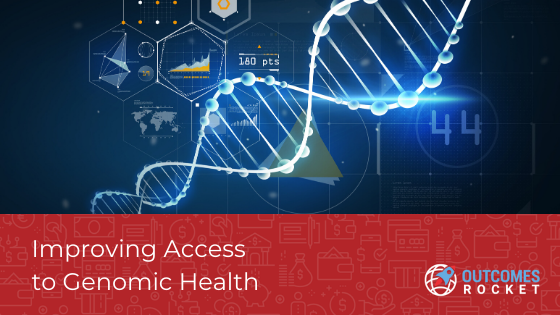
We have come a long way since the first human genome was mapped in 2003. 1NCBI reports that as of Aug 1, 2017, there were approximately 75,000 genetic tests of the market. An average of 10 more are added each day. It is no wonder the terrain of precision medicine through genomic health has become overwhelming to providers and patients.
It is now 2019, so you can only imagine how many genetic tests we now have in the market. What was once a rare test in the early 2000s has now gone mainstream. Today, there are even apps that can decode your DNA. The question becomes, what exactly do you want to decode and how can it be useful?
The increasing demand for precision medicine has boosted the popularity of genetic testing. Millions of Americans are seeking to better understand their genomes and DNAs.
I understand why. When we see our friends and loved ones struggle with a disease, we seek to gain better control of our health conditions and what better way to do it than by understanding our genome, our DNA.
Here is where I think we have a problem.
Complexity is a limiting factor
First, despite the rapid technological growth and understanding about DNA and the human genome, genomic data to improve treatment is a very new thing, and there is no denying its complexity.
Secondly, there is a large demand for geneticists and genetic counselors – specialized medical professionals skilled in interpreting genetic test results — but there are not enough of them. Considering the sheer speed genetic tests that are produced in the market, it is getting more difficult for the small pool of genetic professionals to cope with the demand — the need is greater than the supply.
When the opportunity to add value presents itself, entrepreneurs have found ways to make leaps in going beyond existing infrastructure with the use of technology. Lisa Alderson, CEO of Genome Medical, has some very creative and useful answers to improve access to genomic care and below I will walk you through their solution.
Genome Medical is a national tele-genomics company bringing genomic medicine to everyday care. Its purpose is to deliver the future of healthcare through their nationwide network of clinical genetics expert and efficient genomic care delivery platform. Its team is dedicated to improving patient health and reducing the cost of healthcare delivery. Through Genome Medical, you can help find the testing that is right for you. Whether you want to get an expert opinion, get the right genetic testing, or create a personalized health plan based on the result of your genetic tests, Genome Medical has structured a provider and tech-enabled solution to help you hit the mark successfully.
In my podcast interview with Lisa Alderson, co-founder, and chief executive officer of Genome Medical, she walked us through how they’re improving access to genomic health, both for providers and individual patients.
When it comes to the newness and complexity of genome testing, she said we first need to understand that genomics is a critical component of any precision medicine strategy.
She explained, “One thing that’s exciting about genomics is it actually touches almost all areas of medicine. Eventually, all primary care and specialty care areas like cancer, cardiovascular diseases, neurological conditions, and rare genetic conditions — there will be a stronger anchor in the future of how we deliver health care that relies on our molecular makeup, basically our genetic and genomic information.”
Alderson also added, “It’s just that historically we’ve not had the tools to be able to affordably access that information. And yet it’s our life code. So as you can imagine, your DNA makes you, you.” She covers the main health areas leveraging genomic data today; cancer and reproductive health and further mentions that we’re just scratching the surface on the value we can extract.
“There are many ways in which genomic-based medicine is currently being adopted and where clinical utility as well demonstrated. The two biggest areas are around cancer and around reproductive health. So around cancer, as an example, if we could identify individuals at an elevated risk for colon cancer before they become symptomatic, we could then prescribe a colonoscopy, remove a polyp, and ultimately, more efficaciously treat the patient.”
How about the limited number of genome specialists? What is Genome Medical’s solution? In short, they fill in the gap for community hospitals through virtual care and augment academic health centers to further leverage the power of their genomic services.
According to Alderson, by working with hospitals and health systems. She explained, “Genomics today exists at leading academic centers. And yet the vast majority of patients are seen in the community setting. Only about 17 percent of community health systems have access to even one genetic counselor. For that community health system, we can provide comprehensive care and support across six different specialty areas; cancer, cardiovascular, pediatrics, pharmacogenomics, reproductive health and then general proactive health. And we do it for less than the cost of hiring a single genetic counselor. So for a health system that is working with Genome Medical, suddenly it enables much more efficient access to genetic services and allows that community health system to retain the patient within their health system.”
“In the large academic centers and leading genetic departments, we actually augment their clinical care. In many cases, the referral rate to genetics has grown exponentially. And yet, of course, that workforce of geneticists and genetic counselors has not grown. We can augment existing department-based and genetic services and help create more efficient and faster access to genetics. And so really, we mostly work with hospitals and health systems, although we do see patients directly. For individual patients, we are basically delivering virtual based care. So everything by telehealth, either a video consultation or a phone-based consultation.”
Alderson said this novel business model is also great for payers as well. She mentioned that Genome Medical is working on becoming a network provider with national and regional payers. Currently, they are in a network provider with Cigna.
With its well-rounded business approach, Genome Medical is ready to help more individuals create a longer health-span through genomic health. Are you ready to take the next step? Check them out here.
To listen to our full interview with Lisa Alderson CEO of Genome Medical, tune in here.
1https://www.ncbi.nlm.nih.gov/pmc/articles/PMC5987210/
2https://www.medscape.com/viewarticle/896361
According to the 2020 Centers for Disease Control and Prevention report, roughly 34.2 million Americans have diabetes,...
Read MoreAs a farmer, Rod was used to long days. He worked 18 hours a day, 7 days...
Read MoreWith investors receiving hundreds of pitch decks every year, how do you create a compelling presentation that...
Read More
Brittany Busse Co-Founder, President, and Chief Medical Officer at
ViTelHealth


Stephen Thorne Founder and CEO at
Pacific Dental Services

Keith Carlson Nurse Career Coach